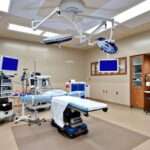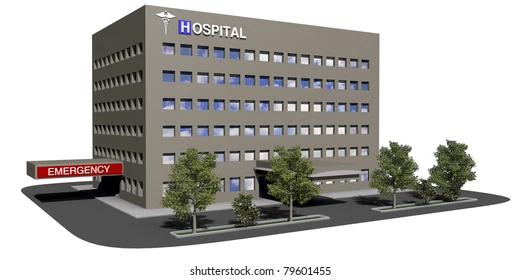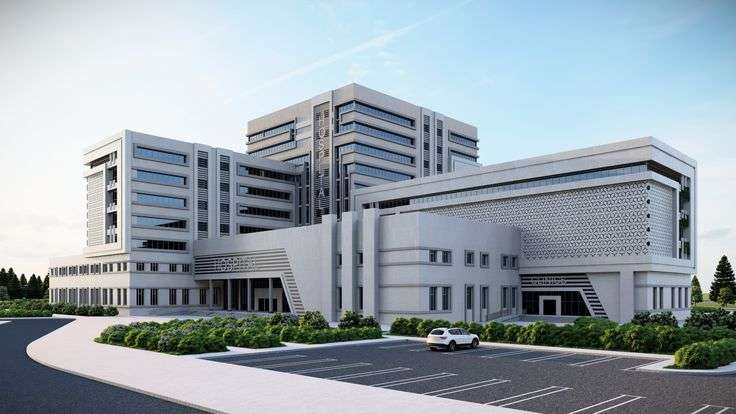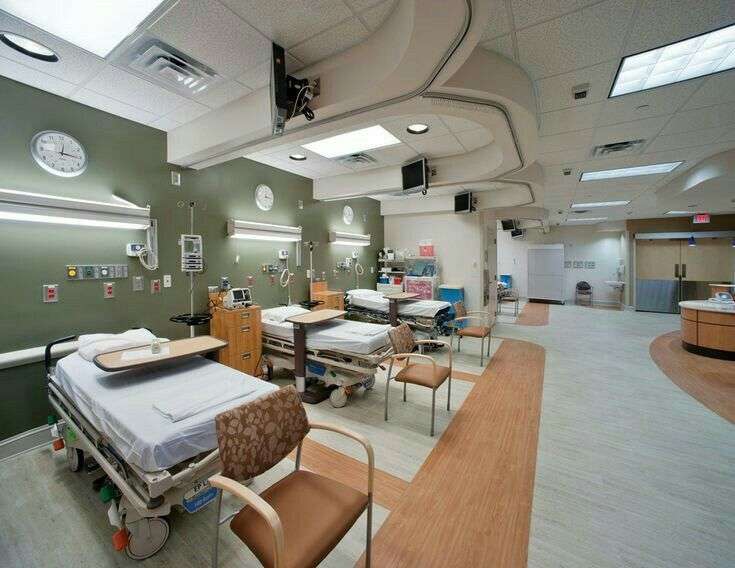
Operation Theatre Planning and Designing: The Ultimate Future Guide
August 6, 2024
How to Utilize Waterproofing in Hospital Construction
August 14, 2024Telangana: A Rising Star in Healthcare Infrastructure
Telangana, the youngest state in India, has quickly established itself as a dynamic and rapidly developing region. Since its formation in 2014, Telangana has not only made significant strides in economic growth but has also placed a strong emphasis on enhancing its healthcare infrastructure. This article explores the vast opportunities in healthcare construction in Telangana, highlighting the state’s commitment to building a robust healthcare system that meets the needs of its diverse population.
Population and Connectivity
- Telangana is the 11th largest state by area and the 12th most populated in India. The state’s population is diverse, with Telugu being the primary language spoken. While the majority of Telangana’s population resides in rural areas, Hyderabad, the state capital, serves as a major urban center and a hub of economic activity. The city’s well-developed air, rail, and road networks play a crucial role in connecting Telangana with other parts of India, facilitating the delivery of services and attracting investments.
Current Healthcare Scenario in Telangana
- Expanding Access and Quality of Healthcare: Telangana has made significant progress in expanding healthcare access and improving the quality of medical services. The state government has implemented various programs aimed at enhancing primary healthcare, maternal and child health, and public health infrastructure. Despite these advancements, challenges such as limited access to healthcare in rural areas and a shortage of medical specialists persist. Addressing these challenges requires continued investment in healthcare infrastructure, particularly in the construction of new hospitals and healthcare facilities.
The Need for Healthcare Infrastructure
- Challenges in Rural Healthcare: One of the major challenges facing Telangana’s healthcare system is the disparity between urban and rural healthcare services. While cities like Hyderabad boast advanced medical facilities, many rural areas still lack basic healthcare infrastructure. The need for new hospitals and healthcare centers in these regions is critical to ensuring that all citizens have access to quality healthcare, regardless of their location.
- The Importance of Building New Facilities: To address these challenges, Telangana has embarked on an ambitious plan to expand its healthcare infrastructure. The construction of new hospitals, particularly in underserved rural areas, is essential to improving healthcare access and ensuring that the state’s growing population receives the medical care it needs.
Key Hospital Construction Projects
- District Hospitals: The Backbone of Healthcare: Under the leadership of Chief Minister K. Chandrashekhar Rao, the Telangana government has launched an ambitious project to upgrade existing district hospitals and construct new ones. These district hospitals serve as the backbone of the state’s healthcare system, providing advanced medical care at the local level and reducing the burden on urban hospitals.
- Super Specialty Hospitals: Catering to Advanced Needs: Recognizing the need for specialized healthcare, Telangana has focused on establishing super specialty hospitals in major cities. Equipped with cutting-edge technology and staffed by highly trained specialists, these hospitals cater to complex medical conditions, offering advanced treatment options to the populace.
- Medical Colleges and Hospitals: Bridging the Gap in Education: To enhance medical education and healthcare delivery, the state government has been actively establishing new medical colleges and associated hospitals. This initiative aims to increase the number of doctors in the state, improve the doctor-patient ratio, and ultimately lead to better healthcare outcomes.

Public-Private Partnerships (PPPs) in Hospital Construction
- The Role of PPPs in Infrastructure Development: Telangana has embraced private sector participation in healthcare infrastructure development through Public-Private Partnerships (PPPs). These collaborations have led to the construction of world-class hospitals, contributing significantly to the state’s healthcare infrastructure. PPPs have proven to be an effective model for leveraging private sector expertise and resources to complement government efforts in healthcare construction.
Focus on Rural Healthcare
- Upgrading Primary Health Centers: The Telangana government has placed a strong emphasis on upgrading primary health centers (PHCs) in rural areas. By enhancing the capabilities of PHCs, the government aims to provide essential healthcare services closer to where people live, reducing the need for patients to travel long distances for treatment.
- Construction of Community Health Centers: In addition to upgrading PHCs, the construction of new community health centers (CHCs) in remote regions is a key focus of the government’s rural healthcare strategy. These CHCs are designed to offer a wider range of medical services, including emergency care, maternal and child health services, and outpatient consultations.
Challenges in Healthcare Construction
- Infrastructure Requirements: The successful operation of hospitals depends on adequate infrastructure, including reliable water supply, electricity, and transportation. Ensuring that new healthcare facilities are equipped with these essential services is a major challenge in hospital construction.
- Recruitment and Retention of Medical Staff: Another significant challenge is recruiting and retaining qualified medical and support staff. The shortage of healthcare professionals, particularly in rural areas, poses a barrier to the effective operation of new hospitals.
- Economic Growth Driving Healthcare Investments: Telangana’s economic landscape has transformed dramatically over the past decade. The state’s GDP has grown consistently, fueled by robust sectors like Information Technology (IT), biotechnology, and pharmaceuticals. This economic boom has created a fertile ground for investments in healthcare infrastructure. As the population grows and urbanizes, the demand for quality healthcare facilities has surged, leading to an increase in hospital construction projects.
Government Incentives and Policies
The state government of Telangana has been instrumental in promoting healthcare infrastructure development. Policies aimed at encouraging private investments, along with public-private partnerships (PPPs), have made it easier for healthcare providers to expand their operations. The government’s commitment to improving healthcare access, especially in rural areas, has further spurred the construction of new hospitals and healthcare centers.
- Enhancing Access to Quality Healthcare in Rural Areas: Telangana’s rural areas have historically lagged behind in healthcare access. The state government’s focus on constructing primary health centers (PHCs) and community health centers (CHCs) in remote regions is bridging this gap. By bringing healthcare services closer to rural populations, these initiatives are significantly improving health outcomes and reducing the need for patients to travel long distances for care.
Technological Integration in New Hospitals
The integration of modern technology is a key trend in the construction of new hospitals in Telangana. From state-of-the-art medical equipment to digital health solutions, technology is playing a crucial role in enhancing the efficiency and effectiveness of healthcare delivery.
- The Importance of Modern Equipment and Technology
Equipping hospitals with the latest medical technology is essential for providing high-quality care. In Telangana, new hospitals are being outfitted with advanced diagnostic tools, surgical equipment, and patient monitoring systems. This not only improves patient outcomes but also attracts top-tier medical professionals to the state.
- Digital Health Solutions and Telemedicine
In addition to physical infrastructure, digital health solutions are gaining traction in Telangana. The adoption of telemedicine, electronic health records (EHRs), and other digital tools is revolutionizing the way healthcare is delivered. These technologies enable remote consultations, real-time patient monitoring, and more efficient management of healthcare data, making healthcare more accessible and effective.
Sustainability in Hospital Construction
As the construction of new healthcare facilities continues to rise, there is a growing emphasis on sustainability. Building hospitals that are not only functional but also environmentally friendly is becoming a priority for both the government and private sector.
- Environmentally-Friendly Construction Practices
Sustainable construction practices, such as the use of eco-friendly materials and energy-efficient designs, are increasingly being adopted in Telangana’s hospital construction projects. These practices not only reduce the environmental impact of construction but also lead to long-term cost savings through reduced energy consumption.
- Energy-Efficient Hospital Designs
Energy efficiency is a critical component of sustainable hospital design. In Telangana, new hospitals are being designed with features like natural lighting, advanced HVAC systems, and renewable energy sources. These designs help minimize energy usage, lower operating costs, and create a healthier environment for patients and staff.
The Role of Architects and Builders
Architects and builders play a pivotal role in the successful execution of healthcare construction projects. Their expertise in designing hospitals that are both functional and aesthetically pleasing is crucial to creating environments that promote healing and well-being.
- Designing Hospitals for Functionality and Aesthetics
Hospital design is a complex task that requires careful consideration of various factors, including patient flow, safety, and comfort. Architects in Telangana are increasingly focusing on creating designs that balance functionality with aesthetics. This approach ensures that hospitals are not only efficient in their operations but also provide a welcoming and soothing environment for patients.
- Collaboration with Healthcare Professionals
Collaboration between architects, builders, and healthcare professionals is essential to the success of hospital construction projects. By working closely with doctors, nurses, and other healthcare providers, architects and builders can create spaces that meet the specific needs of medical staff and patients. This collaborative approach leads to the development of hospitals that are tailored to the unique demands of the healthcare sector.
Conclusion
The Future of Healthcare Infrastructure in Telangana
Telangana’s dedication to expanding and modernizing its healthcare infrastructure is setting the stage for a healthier future. With a thriving economy, supportive government initiatives, and a strong emphasis on sustainability, the state is creating abundant opportunities for growth in the healthcare construction sector. Hospertz India Pvt. Ltd is well-positioned to contribute to this development, offering expertise and services that align with the state’s vision for a robust healthcare system.




